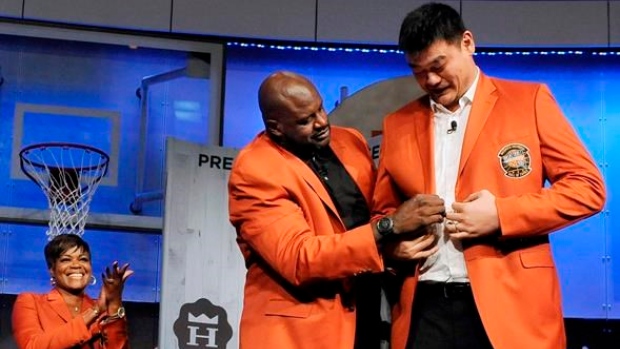Sep 8, 2016
Iverson a no-show for Hoop Hall induction warmup
Allen Iverson wants to thank the haters, too. The former Philadelphia 76ers point guard said he will save time in his Basketball Hall of Fame induction speech to mention the people who criticized him throughout his career, explaining that they are also responsible for moulding the player that earned a spot in the Springfield shrine.
The Canadian Press

SPRINGFIELD, Mass. — Allen Iverson wants to thank the haters, too.
The former Philadelphia 76ers point guard said he will save time in his Basketball Hall of Fame induction speech to mention the people who criticized him throughout his career, explaining that they are also responsible for moulding the player that earned a spot in the Springfield shrine.
"Even the ones that were negative in my career, obviously to try prove them wrong" was a motivation, he said Thursday after arriving late to a pre-induction press conference. "I had to overcome what they said about me. I had to overcome all that to be wearing this (Hall of Fame) jacket right now. The naysayers, they helped me, too."
An 11-time All-Star, Iverson averaged 26.7 points and 6.2 assists in his 14-year NBA career. But he was also a polarizing figure in a league struggling with racial issues, with his tattoos and cornrows and embrace of a hip-hop culture that was at odds with the corporate image the NBA wanted to project.
A dozen years after Michael Jordan joined the league and established himself as its greatest player — and greatest pitchman — Iverson was a different kind of star.
"When it came to basketball, obviously I wanted to me like Mike. Doesn't everybody?" Iverson told reporters on Thursday during a media availability for the Naismith Memorial Hall of Fame Class of 2016. "But I didn't want to talk like him. I felt it was enough being who my mom loved."
Funny at times and emotional at others, Iverson acknowledged that he made mistakes, attributing many of them to entering the league as a 21-year-old with the expectations of a historic franchise on his shoulders. Listing former Philadelphia stars like Julius Erving, Moses Malone, Billy Cunningham and Bobby Jones, Iverson lamented "having to come in there and fill all those shoes — when I was only a size 10 — and those guys are greats."
"I was a puppy," he said. "All the mistakes I was making, I didn't even realize I was making mistakes. I was poor all my life. Then all of the sudden you put your John Hancock down and you're rich. I still don't know. In the aftermath of being an NBA player, I'm still learning ... I'm still finding my way."
Also scheduled to be inducted on Friday night are Shaquille O'Neal, Yao Ming, Sheryl Swoopes, Tom Izzo and Jerry Reinsdorf. Posthumous honorees include 27-year NBA referee Darell Garretson; John McLendon, the first African-American coach in a professional league; Cumberland Posey, who also is in the Baseball Hall of Fame; and Zelmo Beaty, who led Prairie View to an NAIA title in 1962.
Iverson, 41, said his induction will be a proud moment for his fans, and "all the people that are waiting for A.I. to get a chance to say 'He did what you never thought he could do.'"
"That's a great feeling for me," he said. "For all the barbershop talk, the ones that supported me can always say, 'This guy was immortalized by being a Hall of Famer.'"
Questions about Iverson persisted right up until Thursday's news conference.
Iverson was a no-show at the 2 p.m. ceremony where inductees were presented with their Hall of Fame jackets. It's unusual for an inductee to miss the event; even posthumous honorees are usually represented by a family member.
Players were ushered upstairs to a function room to answer reporters' questions shortly after 3 p.m., and O'Neal soon launched into an imitation of Iverson's notorious "Practice?" speech.
"It's the basketball Hall of Fame. I don't know how you miss this," O'Neal said. "I'm going to get my jacket AND my ring."
Iverson arrived at about 3:30 p.m., sliding into a "Naismith Orange" Hall of Fame jacket and taking a seat at his table. Asked about the delay, Iverson said it involved a "personal situation; family."
"That's the first thing you want to know about me, man?" he added. "Why can't it just be good news?"

